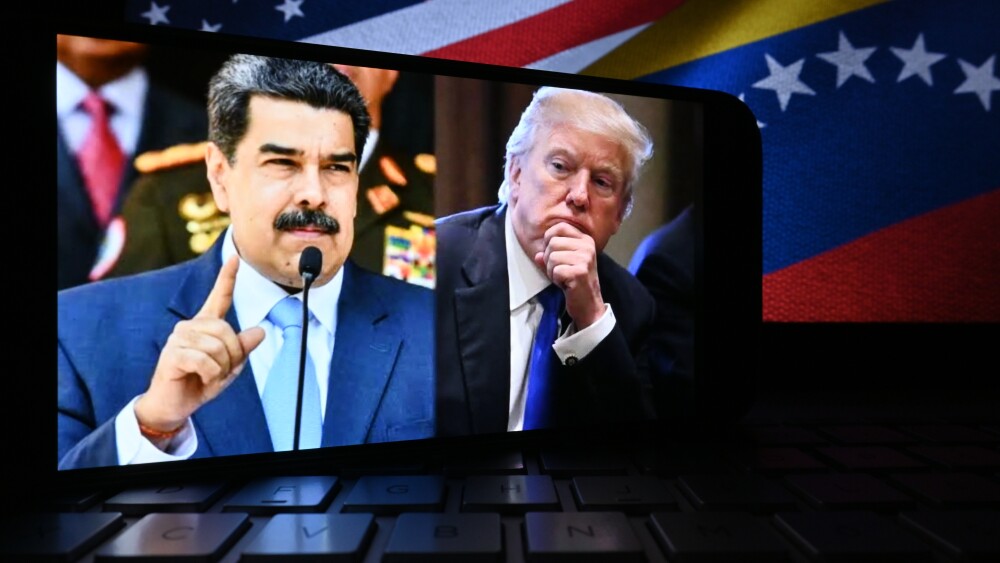As the Trump administration deploys forces into the Caribbean and weighs military action to remove Venezuelan President Nicolás Maduro, the administration also should confront the Islamic Republic of Iran and Hezbollah’s presence in the South American country.
The partnership between Caracas and Tehran dates back to Hugo Chávez’s reign but grew under Maduro. Iran’s Islamic Revolutionary Guard Corps and Hezbollah have used Venezuela to expand their reach in Latin America; partner with anti-Western governments in Ecuador, Cuba, Bolivia, and Nicaragua; evade international sanctions; traffic drugs; and support attacks against the United States and Israel. Today, their cooperation with Caracas includes energy, intelligence, defense, drug trafficking, finance, technology, and nuclear-related activities.
The partnership between Caracas and Tehran dates back to Hugo Chávez’s reign but grew under [Nicolás] Maduro.
The United States should stop this threat not only by treating the Maduro regime as an anti-Western dictatorship but also by designating the regime as a State Sponsor of Terrorism, given its support for Marxist-Leninist terrorist groups and its ties to the Revolutionary Guard and Hezbollah. Labeling Maduro himself as a Specially Designated Global Terrorist would add additional force, given that it would broaden U.S. intelligence and law enforcement tools, pressure foreign actors associated with him, and push allies to adopt similar measures.
Washington also should utilize covert, naval, air, and marine forces to disrupt Iranians, Hezbollah members, and regime figures who engage in illicit activities. Airstrikes against key Venezuelan airports, such as Simón Bolivar International near Caracas and Josefa Camejo Airport serving Punto Fijo and the Paraguaná Peninsula, would cut off major supply routes, given how Iranian airlines such as Qeshm Fars Air and Mahan Air have used them to transport Islamic Revolutionary Guard Corps men, technicians, and Chinese components into Venezuela. The U.S. might also target Venezuela’s state airline, Conviasa, which provides Iran, Hezbollah, and their drug trafficking networks a covert channel for moving personnel, weapons, and other illicit products from Caracas to Tehran.
Strikes against Venezuelan ports would deny access to Iranian oil tankers and Iranian naval vessels in the Caribbean. The El Libertador Air Base in Maracay also deserves military attention because of its role as a hub for Iranian drone production and training.
While the Iran-Venezuela Bi-National Bank is subject to secondary sanctions already, the U.S. Department of the Treasury should increase its measures to coerce an end to its covert support for Iranian banks connected to Iran’s nuclear program. The Bank also acts as a proxy for the Export Development Bank of Iran, routing funds from abroad and hosting officials who look to expand Tehran’s financial reach across South America.
The Trump administration might also target the Megasis supermarket, which serves as a commercial arm for the Islamic Revolutionary Guard Corps-Iranian Ministry of Defense company Etka, which launders money and funds for joint military projects. Targeting the warehouses and facilities in La Guaira that support a joint Iran-Venezuela fiber-optics venture would prevent Tehran from gaining a firmer technological foothold in Venezuela.
Washington might also set its sights on the popular Venezuelan tourist destination, Margarita Island, which has long served as a safe zone for Hezbollah operatives to operate businesses, safe houses, training sites, and document forgery for terrorist travel throughout Latin America.
Washington might also set its sights on the popular Venezuelan tourist destination, Margarita Island, which has long served as a safe zone for Hezbollah operatives.
Targeting Ghazi Nassereddine and other members of the Hezbollah-affiliated Nassereddine clan, who have acted as intermediaries between Hezbollah and senior Venezuelan officials, would significantly affect Maduro and Hezbollah’s leadership. Eliminating Ghazi’s brother, Abdallah, a key businessman with vast holdings on Margarita Island, would damage Hezbollah’s financial activities in Venezuela. Neutralizing the younger Nassereddine brother, Oday, who has assisted with creating paramilitary training centers on Margarita Island, would cut off a significant source of recruitment for Iran’s terror proxy network.
Other targets should include members of the Rada and Saleh clans, who have supported drug smuggling, weapons trafficking, money laundering, and smuggling networks in Venezuela, Colombia, and Lebanon.
While the U.S. Treasury Department’s designation of the Maduro-affiliated Cartel de Los Soles has made headlines, Washington should strike its members affiliated with Iran and Hezbollah, including Adel El Zabayar, who has supported drug trafficking operations and funds Hezbollah and Hamas. The U.S. military should also eliminate members of Tren de Aragua, given Hezbollah’s role as a key financier and money launderer for the group, handling part of the proceeds from its cocaine operations.
By enacting severe sanctions-related designations and targeted military strikes against Iranian and Venezuelan assets in Venezuela, the Trump administration will not only advance efforts to end the Maduro regime but also prevent the Iranian leadership from using Venezuela to rebuild its terror proxy network financially.







